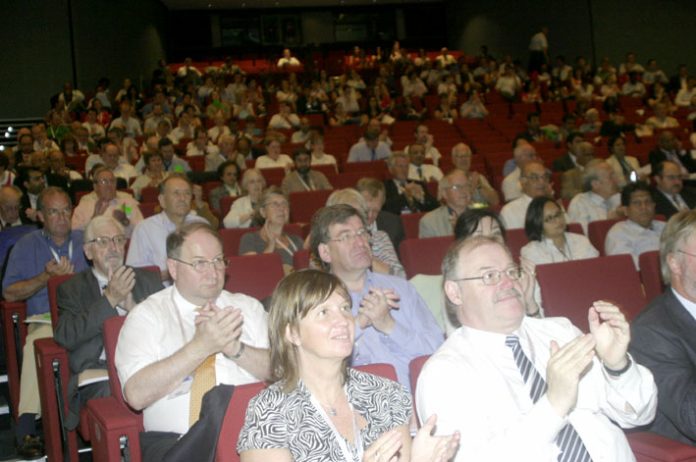
DOCTORS at the British Medical Association Annual Representative Meeting (ARM) yesterday voted overwhelmingly to oppose the government’s ‘local hospital model for London’.
They voted instead to defend NHS District General Hospitals.
This was against the will of the platform and BMA Chairman Hamish Meldrum, and followed a morning of motions opposed to NHS privatisation.
Motion 89 stated: ‘That this meeting
(i) ‘opposes the introduction of “the minimum core services local hospital” model for London, as proposed by Healthcare for London, as it is a clinical risk to patients; and
(ii) ‘calls for the BMA to promote the District General Hospital model.’
Mover Mrs Anna Athow, for the London Regional Council, said the ‘local hospital’ model would mean ‘no intensive care unit, no overnight emergency surgery and anaesthetics, and no consultant surgeons based at that hospital for the emergency take at night – only a surgeon from a Network, which could be another employer such as an agency.
‘Yet the A&E at the front door of the local hospital would be open to undifferentiated emergency patients.’
She added that there would be ‘few junior doctors in the hospital’ and that ‘nurses would be doing doctors’ work’.
She said the effect would be that ‘sick patients in London would have to travel further to reach a hospital providing full acute services.’
Athow warned that under the Darzi models, ‘all high-volume, low-risk procedures must be removed into polyclinics and elective centres, leaving the local hospital financially unviable’.
She added: ‘It would appear that the rationale for these changes is not about improving healthcare, but the implementation of a plan distinctly friendly to the commercial, private sector.’
She said: ‘There have been many years of experience with the District General Hospital.
‘This model ensures a high concentration of consultant-led services on one site so that every aspect of acute care can be treated in an emergency, with only a small minority of patients being sent to a tertiary centre.’
She concluded: ‘We should defend and promote the District General Hospital as the safe model and insist that the local hospital model is not safe, and we should oppose it.’
The motion was opposed by Jonathan Fielden, the retiring Chairman of the BMA Consultants Committee.
He claimed that ‘there is no one-size-fits-all, there is no such thing as a District General Hospital model anymore.’
Supporting the motion, medical student Esoh Omoregie said: ‘The local hospital model will not have the training opportunities for junior doctors.
‘They would provide a minimal quality of training. The patients will get care in a minimal sense.’
The Conference Chair Meldrum called for the meeting to take the motion as a reference back or to reject it.
In her right of reply Athow insisted: ‘The minimal core hospital model is unsafe because it is without ITU.
‘If there were no District General Hospitals, why did Darzi say District General Hospitals must be closed.’
She insisted to applause, ‘Darzi talks about financial sustainability not clinical sustainability.’
Earlier, delegates passed Motion 16, which reaffirmed that the first duty of a doctor ‘will always be the care of their patients, above political, ideological and financial pressures and targets.’
Mover Dr Andrew Dearden, chair of the Welsh Council, said: ‘I never shed a tear when I go over-budget, but I do shed a tear when an older patient dies.’
Delegates went on to vote for Motion 40, that condemned the deaths at Mid Staffordshire NHS Foundation Trust, and that deplored ‘trusts being driven by perverse competitive targets to achieve foundation status’.
Speaking to the motion, mover Dr George Rae said: ‘The main reason the problems arose was from the government’s reform agenda. They are a result of a market-based health agenda.’
Speaking for the motion, Dr Mary McCarthy, from Shrewsbury, said: ‘Concentration on targets distorts clinical care. We already have less beds per head of population than anywhere in Europe.’
Conference also voted for Motion 42 against the commercialisation of the NHS.
A call for a national march and rally was approved by 53 per cent of delegates, but it fell because of a ruling that a two-thirds majority was required.